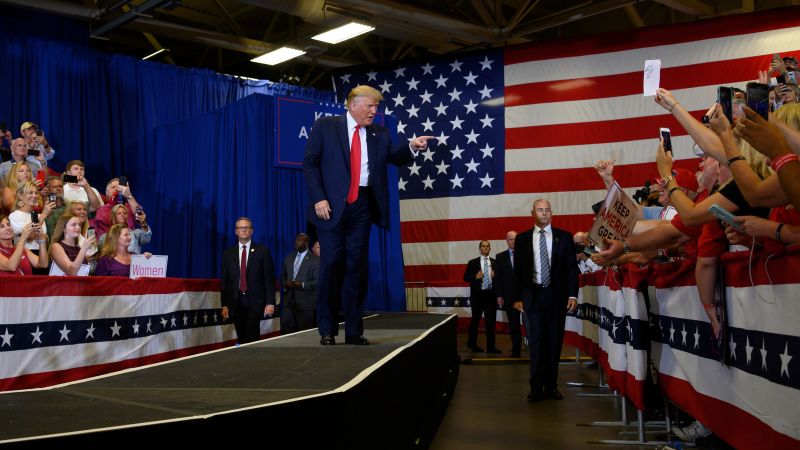In 2018, Jonathan and Trista Schmier felt the economy was so strong that they could take a big risk. They quit their property management jobs and opened a restaurant, Rustic Burger, in Fayetteville, North Carolina.
Trista Schmier, who had long dreamed of owning a restaurant, designed the menu, which offered 20 types of burgers. The couple, who are in their 40s and have two sons, had no trouble filling jobs, which paid $9 an hour to start, and food was affordable enough for them to offer a burger, side and 20-oz drink for $9.99. The following year, they opened a second location and were in the process of opening a third when the Covid-19 pandemic hit in 2020.
In 2022, the Schmiers felt the economy was so troubled that they had to shutter the restaurants and go back to property management. It was hard to find reliable workers, and they couldn’t afford to pay $14 an hour to compete with applicants’ other offers. Food prices had skyrocketed — chicken wings cost $93 a case, up from $40; buns were 87 cents each, up from 33 cents; and Angus beef was $1.66 a patty, up from $1.08.
“We couldn’t keep raising our prices,” said Jonathan Schmier, who received backlash when they began charging $10.99 for the burger, side and drink. “The customers got very, very upset.”
The couple are among the millions of Americans who feel the economy was stronger under former President Donald Trump and want him back in the White House so that prosperity can return.
Poll after poll show that voters have more faith in Trump’s ability to handle the economy than President Joe Biden’s. Some 51% of registered voters said they trust Trump more to handle the economy, compared to 32% who trust Biden more, a CNN poll taken in late June found.
Likewise, a Pew Research Center poll released in mid-July found that 54% of registered voters are at least somewhat confident in Trump’s ability to make good decisions about the economy, versus 40% who feel that way about Biden.
Americans have the same view on the economy now as they did during the early months of the Covid-19 pandemic, said Carroll Doherty, Pew’s director of political research. Some 23% of the public said they thought the economy was “good” or “excellent” in April 2020, when most of the nation was under lockdown and millions had lost their jobs, and this past May, when inflation was the top problem.
By contrast, some 57% of folks felt that way about the economy in January 2020, which Doherty said was more positive than at any point in the previous two decades.
Trump presided over a strong economy … at least until the Covid-19 pandemic hit in March 2020, causing the job and stock markets to crater.
When Trump entered office in 2017, he inherited and continued what would be the longest employment expansion on record. From Trump’s inauguration in 2017 through February 2020, an average of 181,500 jobs were added on a monthly basis. The unemployment rate hovered around 50-year lows of 3.5% in the months just before the pandemic began, and the rate for Black Americans hit a record low of 5.3% during his administration. (However, that rate went even lower during the Biden administration and hit 4.8% in April 2023.)
Before the pandemic, median household income saw the biggest spike in more than four decades — hitting a record high of $68,700 in 2019, according to the US Census Bureau. The poverty rate fell to 10.5%, the lowest since records started six decades earlier.
Trump’s presidency also included the continuation of the longest bull market in history, which began shortly after former President Barack Obama entered office.
By many measures, however, the economy under Biden — who took office while the pandemic was still underway — has also been strong. The resilience of the US labor market during the past two years has exceeded the early part of Trump’s presidency. Until May, the unemployment rate held under 4% for 27 months, matching a streak last seen in the late 1960s. Meanwhile, the employment rate of women in their prime working years ticked up to a new all-time high of 78.1% in May.
But for people — especially for those who have jobs and were not recently unemployed — there’s more to the economy than a strong labor market, said Bernard Yaros, lead US economist for Oxford Economics.
“This is where inflation really matters a lot,” he said. “What has really colored households’ perceptions about the economy has been inflation.”
Prices may not be rising as quickly as they have been — the latest Consumer Price Index showed annual inflation at 3%, matching the lowest rate of increase seen in three years – but that might not bring much solace to American households.
The overall CPI index is a good 20% higher than it was in February 2020. (In recent history, for a comparable 54-month period, that increase would be around 10%, BLS data shows.)
The sharpest rise in prices since the early 1980s also ate away at Americans’ paychecks for many months on end. That was a sharp turnabout from the early years of the Trump administration, when take-home pay was steadily climbing. (Technically, Trump’s four years did see the highest real wage growth since former President Jimmy Carter was in office; however, it was due to the massive loss of 21 million jobs, the majority being in lower-paying industries and lifting average pay data as a result.)
“People aren’t economists, they don’t think like economists, they don’t look at the rate of change in consumer prices … they’re looking at how much a dozen eggs cost now compared to two years ago,” Yaros told CNN. “This is really where I think Biden has gotten dinged by, in terms of his public image of his handling of the economy.”
Inflation is expected to weigh on the psychology of the swing voter, Yaros wrote in a research briefing earlier this year modeling out the upcoming election.
Yaros and colleagues found that if voters in swing states focus on the cumulative increase in the level of prices since Biden’s inauguration, Trump is expected to win; however, if they focus on the year-over-year change in prices or their inflation-adjusted incomes, Biden is poised to win.
Although Ted Southworth considers his financial situation to be “comfortable,” inflation has still had a big impact on his and his wife’s lifestyle. Among the changes: They have fewer steak nights at their Burlington, North Carolina, home and eat out less frequently at higher-end restaurants. They are keeping their SUV when the lease expires, instead of getting a new car.

Southworth, who retired 15 years ago from his job as director of corporate purchasing at a truck manufacturer, is concerned that prices could continue to rise.
“I trust the other guy better,” said Southworth, 74, referring to Trump, whom he voted for in 2016 and 2020. “During Trump’s term, there was very little inflation. I don’t think we’ve got inflation under control yet.”
Becky Cantrell, who lives in Land O’ Lakes, Florida, feels the price hikes whenever she goes to the supermarket. Recently, she decided to stop buying mayonnaise because it now costs $7.88, compared to $5 a few years ago. And, she pointed out, Dollar Tree ended $1 prices after 35 years and raised most items at stores to $1.25 in late 2021.
Cantrell, whose husband died in November 2020, had trouble finding a job that paid enough to afford the swiftly rising prices, forcing her to work two jobs and take in a friend as a roommate. Finally, in March, she landed a human resources position at a health provider that gives her some “breathing room.” But she still plans to vote for Trump in November.

“Everything was just more affordable before Biden became president,” said Cantrell, 59, the mother of two adult sons.
Read the full article here




